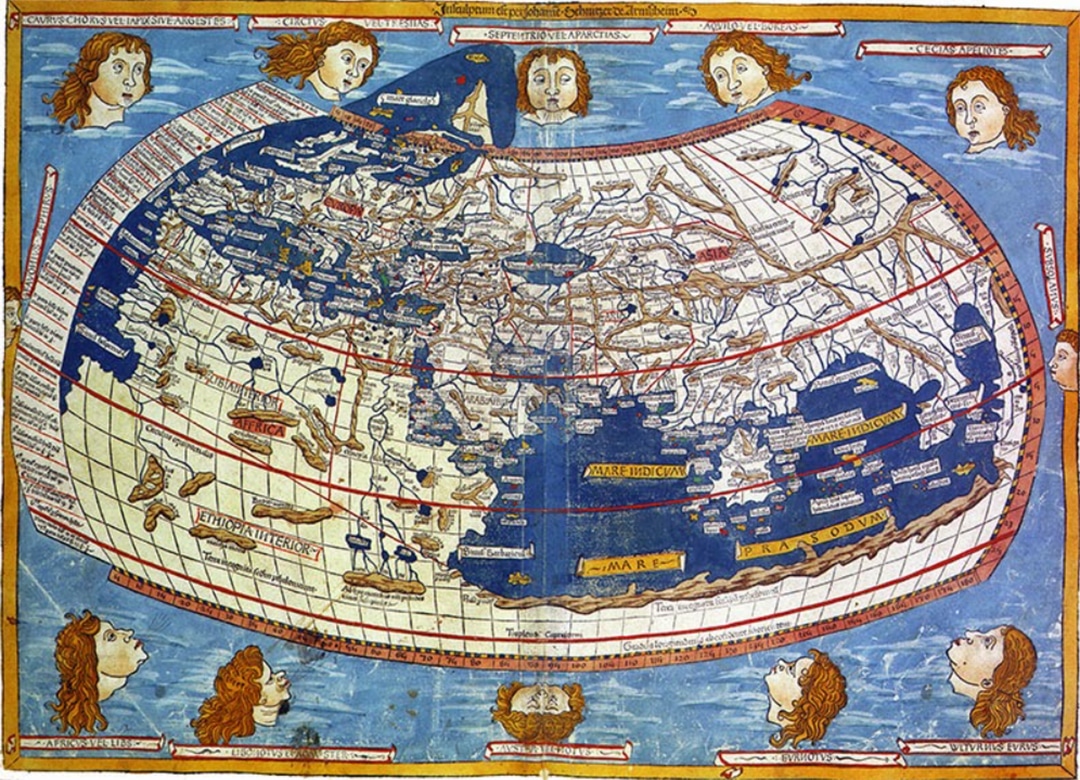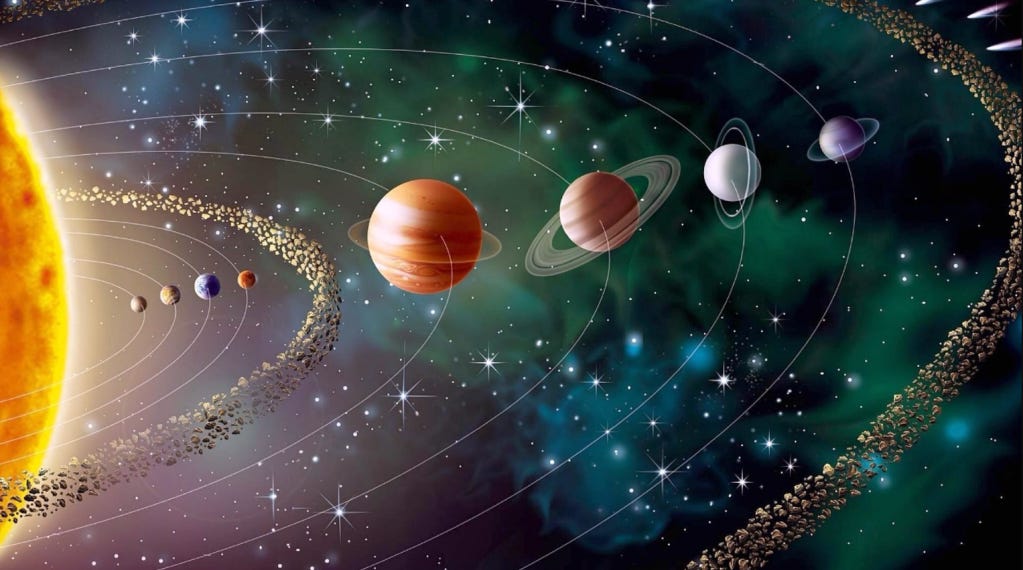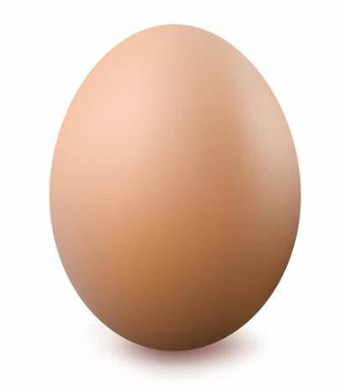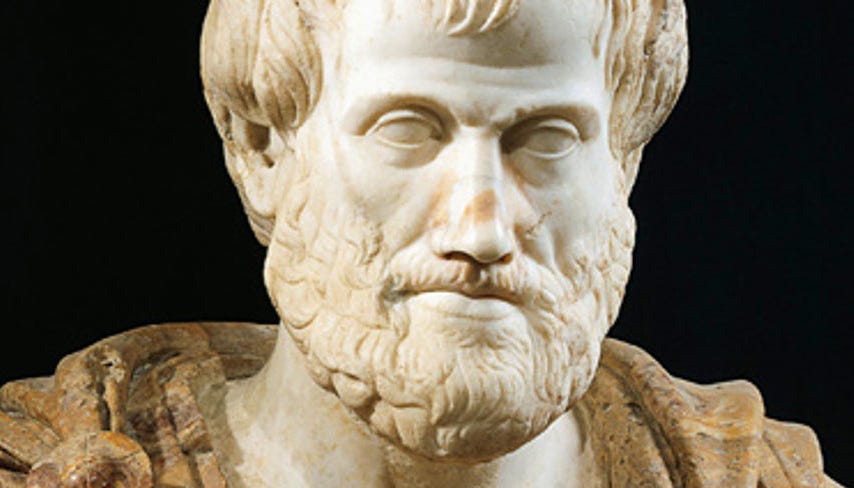Subscribe to Zero-Sum Pfear & Loathing



by W.D. James | Apr 10, 2024
We sang the songs of childhood
Hymns of faith that made us strong
Ones that Mother Maybelle taught us
Hear the angels sing alongi
– Will the Circle Be Unbroken, Roy Acuff’s lyrical adaptation
For the duration of the classical period, the Greek philosophers were able to retain a marvelous appreciation for the bare fact of existence. Why is there something instead of nothing? Plato famously said that philosophy was born of wonder. Further, why is it that when we look about there’s all these things? How do they come to be? The Greeks pretty much assumed some sort of primordial chaos (they were really not able to conceive of creation from nothing, a staple of the cosmology of the Abrahamic faiths). But chaos never remained chaos. It was mysteriously propelled toward order. A particular order might decay, and we might refer to that as chaos (a political society that devolves into civil war between competing warlords, for instance), but it’s never full chaos. The Greeks could theorize full chaos, it would be right next door to non-existence, but we never really encounter it. It is a universe of things, not of chaos. Systems form (galaxies, solar systems, organisms, social systems). As we might say, complexity evolves.
For things to be things, and not just stuff, they have to take on form. There is the stuff things are made of, but then there is the form which makes the thing the discernable thing that it is (a dog, an atom, a beret). Plato is the archetypal philosopher of Being, of the form of forms. Aristotle is the philosopher of Becoming, of how the stuff becomes the things it becomes. As such, he is also the philosopher of the cause of social things—how associations come to be.

The Greeks can be wonderfully nuanced. To ask how (and for Aristotle, we may also ask why) something comes to be is to ask: what caused it? When we moderns answer this sort of question, it usually takes the form of: X did such and such, which caused Y to do such and such. What caused the 8 ball to drop into the corner pocket? The pool cue struck the 2 ball in such and such a way, which, operating under Newton’s laws of thermodynamics, moved with a certain amount of energy, which upon striking the 8 ball produced an equal and opposite reaction such that the 8 ball travelled across the table at a calculable speed, dropping (due to gravity) into the pocket.
So, if we asked how a person sank the 8 ball, the account would look more or less like that. Similarly, if we are talking about the coming to be of biological organisms. Well, Ralph’s mommy and daddy met and liked each other, and then something about birds and bees, supplemented with something about genetics, and then some stuff about wombs and birth canals and that is how Ralph came to be. Aristotle would say, ‘yes, well and good. However, that account is ¼ of a full account of how something was caused to be and it’s not even the most interesting quarter.’
On his account, whenever something comes to be, there are four types of causation involved, all operating simultaneously. The sort of accounts given above he termed ‘efficient causation.’ There are also ‘material,’ ‘formal,’ and ‘final’ causation. By material causation Aristotle meant what kind of material is involved (he wasn’t an atomist and held to a qualitative view of different sorts of matter). By formal causation he meant what caused it to take on the form it did (by including genetics in the above account, we pulled in something like formal causation).

But the really exciting thing, and the thing that will make us twist our reductive modern minds to see it, is final causation. This sort of represents a chronologically backward form of causation. We might want to just say that can’t be, but in a universe that (as revealed by modern physics) involves causation (or action) ‘at a distance’, which quantum mechanics and field theory have had to try to account for, maybe it’s not too weird.
To try to get our heads around this, we will start with an account that is overly simplified and not really Aristotle’s view, but which I think will help us get to a better account (rather tongue in cheek). We start with the example of the perennial philosophical puzzle: which came first, the chicken or the egg? Plato answered, ‘neither; the abstract form or idea of the chicken came first.’ Aristotle answered, ‘the egg came first…..but it wanted to be a chicken.’ That is, the chicken (which chronologically comes later), is the cause of the egg (along with the efficient, material, and formal aspects) in some real sense. The egg wants to be a chicken; its purpose (or ‘end’) is to become a chicken. Further, the meaning of the egg is found in its aspiration towards being a mature chicken.
The whole point of Aristotle’s science, his account of causation, really turns on this inclusion of purpose and meaning. These are absolutely banished from consideration in modern science (we will see some of the ramifications of this toward the end of this essay). He is not going to give us an account of nature that is devoid of purpose and meaning, which has subjected we moderns to no end of angst, anguish, and nihilism.
However, I would suggest this is the substance of our ‘common sense’. We talk all the time as if natural processes have a purpose and meaning. Even evolutionary biologists constantly slip into this sort of talk. ‘The such and such snail evolved the ability to secrete a viscous substance to aid it in scaling vertical surfaces.’ They will then correct themselves to get in line with natural selection via random mutation: ‘I was only speaking metaphorically, of course it was an accidental mutation that just so happened to increase the snail’s ability to ascend vertical surfaces, thereby adapting it better to its environment and enabling it to better survive, reproduce, and pass on that mutation.’
Further, Aristotle’s naturalism includes a normative component. Let’s see how. To cut to the chase (pun intended), thoroughbred horse fetuses have a final cause of becoming thriving thoroughbred horses (of course I use horses as the example, it’s a Kentucky thing). For Aristotle, every living thing has an inbuilt propensity to become a fully developed, flourishing example of what it is. If all goes right it will succeed, if it goes wrong, maybe not. If Sally the Thoroughbred gets all the nutrition she needs, avoids illness and disease, and grows into maturity, she will invariably become a healthy adult thoroughbred (she will under no circumstances become a chicken, a toaster, or a palm tree). She will be strong, swift and well-tempered. We will say of her, ‘she is a good horse’ and anyone who knows horses will know what we mean. If something goes wrong along the way, she may become a bad adult thoroughbred. If we wish to spare her feelings, we will say ‘she’s an ok horse’. And we’ll all know what we mean. The important thing here is that the (at this point non-moral) terms ‘good’ and ‘bad’ have an objective meaning and they are rooted in nature (the species nature of thoroughbred horses). We have an account of nature that is purposive, meaningful, and normative. Aristotle rocks!

To get just a bit more of Aristotle’s theory in before we turn to the question of society, let’s talk about souls. Aristotle says there are three basic kinds (if he prefigures Gaia theory, there would also be a world soul): plant, animal, and rational. Aristotle is a materialist, but his matter is infused with soul (psyche). You can’t separate soul out from body such that it would make sense to talk about a soul living after death or anything like that, but soul and body, though always united in life (both eventually go away in death), are conceptually distinguishable. By ‘soul’ Aristotle basically means the characteristic pattern of life of a thing.
Plants, with their plant souls, grow and reproduce. That’s pretty much it. Animals grow, reproduce, and move.
Critters with rational souls (and Aristotle also defined us as “rational animals”) grow, reproduce, move, and worry about it. That is, their final ends (aim, purpose) become a subject they can contemplate and will have to make decisions about. So, when we set about worrying about what our purpose and aim are, Aristotle thinks our reason shows us the answer. He says it is to be happy. By ‘happiness’, he does not just mean pleasure. He means flourishing, to fully actualize the potential of our being.
Aristotle thinks this is the right conclusion because anything else we could propose doesn’t turn out to be the final purpose. We might want money. Why? So that we can buy things, be secure, etc… It’s not just to have the money, it’s to have what the money can bring. Ultimately, because we think it will feed into our happiness. We might want power. Why? Similar story, it’s not the power, per se, it’s how we can use the power. Why do we want happiness???? To be happy. Ultimately, all the other things we might want, we want because they will contribute to our happiness. Hence, the final end of rational creatures is happiness. All that we do, all the goods we seek, are because they will (or we think they will) contribute to our happiness. Further, to fill out a theme from last time as well, we can better see what is the essence of our desiring: the love and longing for happiness.

For Aristotle, at least when the question is about politics, there are three characteristic forms of association people engage in. As we saw last time, we engage in any of these associations because we believe they will help us achieve something good. We now have the objective criteria of that: they will bring us more happy, more flourishing, lives.
He begins his discussion of forms of association: “In this [the study of political association], as in other fields, we shall be able to study our subject best if we begin at the beginning and consider things in the process of their growth. First of all, there must necessarily be a union or pairing of those who cannot exist without one another. Male and female must unite for the reproduction of the species – not from deliberate intention, but from the natural impulse, which exists in animals generally…”.ii
Hence, of necessity, we have families. How so of necessity? You don’t get humans to go about associating in any other ways unless you have humans associating in the reproductive way. It’s important that Aristotle notes that this might not be our intention with forming a family, but it is nature’s intention. Nature has its ways. Families will be formed. Humans just keep doing it, here, there and everywhere. For Aristotle the empiricist, that’s the natural story then. The efficient cause is something like the story told above about Ralph. The material cause is male stuff coming together with female stuff. The formal cause is that a structure capable of reproducing, nurturing, and bringing to maturity children will take shape. That will look different in different placesiii, but any place that succeeds in replicating itself with new humans will have a version of it.
The final cause, or purpose and meaning, is to reproduce the species (we might have all sorts of other goods we are seeking as well, sexual satisfaction, intimacy, economic security, whatever, but what Aristotle sees nature doing is keeping the species going). Further, we will seek these out because we believe they will contribute to our happiness. But our happiness, flourishing, is not complete in the family.
Families are not self-sufficient. Therefore, they are not the highest or last form of human association. Our society must continue to grow. “The next form of association,” he continues, “which is also the first to be formed from more households than one, and for the satisfaction of something more than recurrent daily needs—is the village.”iv He goes on to explain that we form villages that we might live well, by which he basically means materially. We will have greater security, we can work with others, possibly trade a bit, maybe specialize a little bit—live better. In terms of the efficient cause of villages he recounts several ways in which villages spring up from the associating of several families. The material cause is families. The formal cause is the basic form of the village which does not vary so much from Croatia to Siberia to Ghana. The final cause is the living well objective, the betterment of our material lives through shared endeavor.

Aristotle continues: “When we come to the final and perfect association, that formed from a number of villages, we have already reached the city [or polis]. This may be said to have the height of full self-sufficiency; or rather we may say that while it comes into existence for the sake of mere life, it exists for the sake of a good life.”v The efficient cause is the villages in proximity to one another joining together. The material cause is the villages. The formal cause is the structure of a city. The final cause he says is the “good life”. He means something quite different by this than by “living well” in a village. While a city might further the security and cooperation present in the village, it adds a qualitatively different element. We are now in the area of goodness, or morality. In addition to other things a city will afford us, it allows us to reason with one another about Justice. We will have to collectively decide how we are going to live together. What will be permitted and what not? How will responsibilities and rewards be distributed? What is owed to whom? Why be just? — so that we may be happy.
In political terms this manifests itself in the norm of ‘the common good,’ which we will look at in more detail next time. It also means that together we govern ourselves. Here is where our communal moral lives are integrated into the overall human aim: flourishing lives that have developed all of our innate potential such that we may be fully happy. This is the sense in which the city is self-sufficient: it is the smallest entity in which we can be fully and gloriously human. As political animals, the city has drawn us along from seeking mere life, to living well, to living good lives.
Ah, bigger is better then for Aristotle? To a point. To the exact point of the self-sufficient city-state composed of several villages. And beyond that? Beyond that, you might secure the goods of social life to some extent (the Roman empire is probably more secure from foreign invasion than just the city of Rome would have been). However, you start losing aspects of goodness quite quickly. No longer can all the citizens participate directly in the rational pursuit of justice together; more and more people are just subjects, who will not actualize the goods of political association and, hence, fail to fully develop their human potential as well.
Also, we might note that there are a plethora of other associations for Aristotle, but they are not expressly related to the city. We form friendships, canoeing groups, organized crime syndicates, and all sorts of other things to try to obtain various perceived goods. When we get to MacIntyre, he will be more interested in this wider array of associations.
The thinkers who initiated the modern project, such as Thomas Hobbes in theorizing the modern state and René Descartes (the guy who doubted everything except that he was thinking) in theorizing the modern self, quite overtly and forthrightly set their philosophical sights on Aristotle.
This is usually presented as a story of liberation from the intellectual constraints of ‘scholasticism.’vi Is that really how things worked out though? Essential to their task was especially to banish any conception of final ends. You see, those imply a human nature and an objective human good and have vast implications for our social lives. I will not have time to unpack all of this, but the medieval theorists had deduced from Aristotle’s conception of ‘the common good’ all sorts of moral constraints on individuals’ pursuit of their individual goods at the expense of the shared common good. Things like restraints on lending money at interest, rents, property rights, etc…, etc…
A slightly suspicious person might suspect the moderns were looking to undercut society’s defense of the common good to free up some particular set of people’s pursuit of their individual goods.

i A performance by the Nitty Gritty Dirt Band, with Roy Acuff, Johnny Cash, and others: Nitty Gritty Dirt Band – Will the Circle Be Unbroken [Live] – YouTube
ii Aristotle, Politics, translated by Ernest Barker, Oxford University Press, 1998, p. 8.
iii Aristotle is a master of seeing and admitting the validity of a diversity of options, and also of seeing what they might have in common. When he says, as he does at the beginning of the book, that we should ‘observe,’ he means it. He looked over the whole world known to him for examples of different political constitutions, different ways a society could be organized. His student was Alexander the Great. As Alexander set about conquering the known world, he continually sent Aristotle back examples of plants and animals, and accounts of cultures he and his army encountered, for Aristotle to study.
iv Op. cit., p. 9.
v Ibid, p. 10.
vi The medieval schoolmen, or scholastics as they came to be called, did become rather rigid. This was after the rediscovery of the thought of Aristotle. His works had basically been lost to Western Europe during the fall of the Roman empire and the ‘dark ages.’ Around the middle of the 12th century, European thinkers started to regain access to his thought via Islamic sources. Thomas Aquinas, father of all the scholastics, famously reconciled the thought of Aristotle (whom he simply and reverently referred to as ‘The Philosopher’) with Christianity. Perhaps unfortunately, those medieval monks were good logicians, so they got busy working out all the implications in great (and often boring) detail.
This essay was first published on Winter Oak.